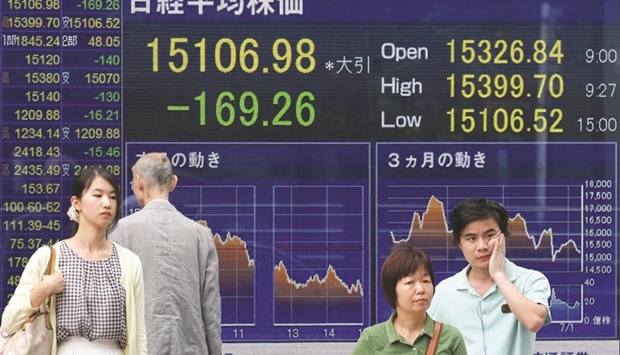Asian markets fell yesterday at the end of a volatile week dominated by the fallout from Britain’s European Union exit, with investors now turning their attention to the release of US jobs data.
The June non-farm payrolls figures from Washington will be pored over for clues about the Federal Reserve’s interest rate plans in light of the Brexit vote, following a surprisingly low reading in May.
They come after a week of losses in stocks around the world, after the head of the Bank of England said the risks of leaving the EU were “crystalising” and British property investment funds suspended client withdrawals to prevent a run on them.
“While a strong June report is not going to ring alarm bells for an imminent rate hike, strong print tells the market that when the post-Brexit dust settles, the door will be open for the Fed to resume a path of interest rate normalisation,” said Stephen Innes, senior trader at OANDA Asia Pacific.
Tokyo fell 1.1% — a fourth-straight loss ahead of weekend elections to Japan’s upper house that are expected to see a win for Prime Minister Shinzo Abe’s party despite the country’s stuttering economy.
Shanghai ended 1% lower and Seoul shed 0.6%.
Hong Kong finished down 0.7%.
Singapore dipped 0.9% but Sydney closed slightly higher.
European markets provided a positive lead after the release of minutes from the European Central Bank’s pre-Brexit policy meeting hinted at more potential stimulus if Britain voted to leave the EU.
Weak German data added to expectations of further monetary support.
London’s FTSE 100 also produced a healthy rally thanks to bargain-buying after recent losses.
On Friday in European trade London and Frankfurt each rose 0.2% and Paris added 0.1%.
On currency markets the lingering fear of riskier assets weighed down the dollar against the safe-haven yen, while the greenback climbed against emerging market and higher-yielding units.
The dollar was trading at ¥100.61, from ¥100.76 in US trade, with traders guessing as to whether Japan’s central bank will step in to protect the country’s exporters from the impact of a stronger currency.
Australia’s dollar eased 0.3% against the US unit, while the South Korean won was down 0.5% and Indonesia’s rupiah shed 0.4%.
Britain’s pound edged up to $1.2930, unable to break above the $1.30 mark but stronger than the 31-year low of $1.2798 touched on Wednesday. Oil prices bounced back slightly yesterday after a mauling the day before fuelled by a smaller-than-expected fall in US inventories.
US benchmark West Texas Intermediate added 0.9% to $45.56 and Brent rose 1.1% to $46.92.
WTI fell 4.8% on Thursday and Brent shed 4.9%.
In Tokyo, the Nikkei 225 down 1.1% at 15,106.98 points; Hong Kong — Hang Seng down 0.7% at 20,564.17 points and Shanghai — Composite down 1.0% at 2,988.09 points at the close yesterday.

Pedestrians stand in front of an electronic quotation board in Tokyo. The Nikkei 225 closed down 1.1% to 15,106.98 points yesterday.
